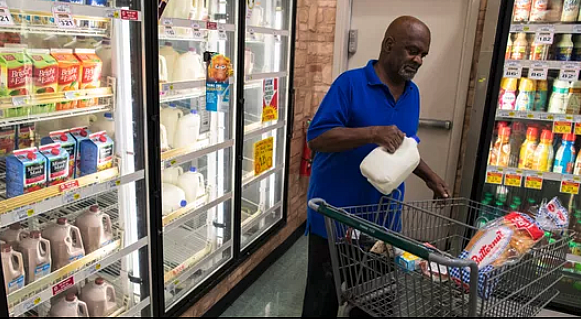Tell us: How do you get food where you live in Louisville?
The Courier Journal has received support from the University of Southern California's Center for Health Journalism to embark on a project about food insecurity in Louisville, with the goal of presenting solutions that fit our community.
Other stories in this series include:
Tell us: How do you get food where you live in Louisville?
Dare to Care relocation may bring job training, grocery to the West End
Shelby Park's Save-A-Lot closed with little warning to neighbors
Sorry, we're closed: How everyone is hurt when grocery stores shut down
In 30 seconds: What you should know about food deserts in Louisville
Tuition or food? How college kids use food pantries to help food insecurity
Louisville has a fresh food problem. Can we fix it?
'A real crisis in Louisville': Readers respond to food desert series
How a low-income Louisville neighborhood became a fresh food oasis
How can cities end food deserts? Here are 4 solutions that worked
Louisville families shouldn't be struggling to find fresh food
No grocery store in your neighborhood? Join forces to create one
People can't get to a grocery store easily. So these volunteers are driving them
Would you shop at a mobile grocery store? Kroger is betting on it
Where You Live Determines How Much Your Eggs Cost at Kroger
How some residents get their food in Louisville's food deserts
Louisville's vacant grocery stores find new tenants. But they won't sell food
How these Louisville companies are helping employees buy affordable fresh produce
Can indoor farming fix food deserts? These Louisville students think so
Kentucky's hunger initiative earns national attention. But thousands still need food
Downtown Louisville is growing rapidly. So why doesn't it have a grocery store?
Is crime driving grocery stores out of Louisville's low-income communities?
Louisville kids are still at risk for lead poisoning. Here's how healthy eating can help
When will downtown Louisville get a grocery store? Here's what we found
Everything you need to know about Kroger's mobile grocery store in Louisville
Kroger's mobile market brings fresh food to Louisville neighborhoods without access
This nonprofit leader is giving west Louisville the black-owned grocery it 'deserves'

(Photo: Alton Strupp/Courier Journal)
Over the past decade, study after study has shown that thousands of people who live within certain areas of Louisville don't have adequate access to food.
Grocery stores are few and far between in communities like west and south Louisville. And if residents there don't want to do all their shopping at small convenience or discount stores, they often have to spend extra time and money to travel to supermarkets outside their neighborhoods.
TELL US HOW YOU GET FOOD FOR YOUR FAMILY (Google form)
The gaps in access can deepen financial hardships for already struggling families and can lead to a variety of health disorders that lower life expectancy.
According to the 2017 Louisville Metro Health Equity Report, people living in west Louisville have an average life expectancy of about 70 years — 12 years lower than the average life expectancy for people living in the city's far east end.
Nonprofits have attempted to address the disparity by creating innovative produce markets, community gardens and even a frozen foods pop-up shop, while metro leaders have worked with grocery operators to keep stores in the under-served areas.
But the gaps persist — and we want to help offer solutions.
The Courier Journal has received support from the University of Southern California's Center for Health Journalism to embark on a project about food insecurity in Louisville, with the goal of presenting solutions that fit our community.
As part of that project, we've launched a survey to learn about individual residents' grocery shopping habits.
Is it hard to for you to get food where you live? What makes it easy or difficult? We want to know.
You can help us make sense of what's going on in our community by answering thequestions below at courier-journal.com. We won't publish any information you share without your permission.
Have a question or just want to talk? Email bloosemore@courier-journal.com or call 502-582-4646.
[This story was originally published by Courier Journal.]

